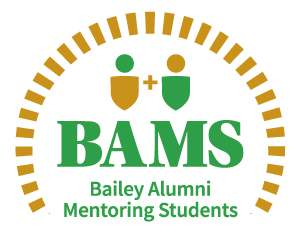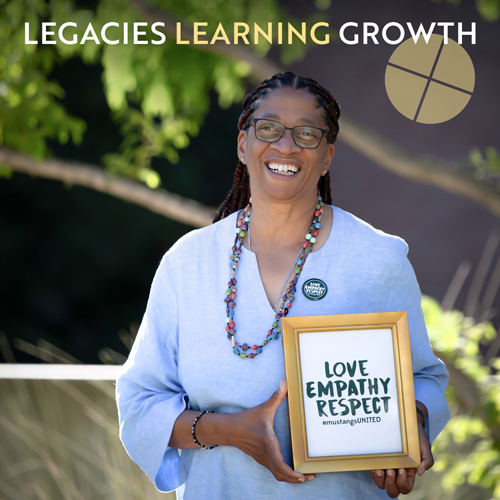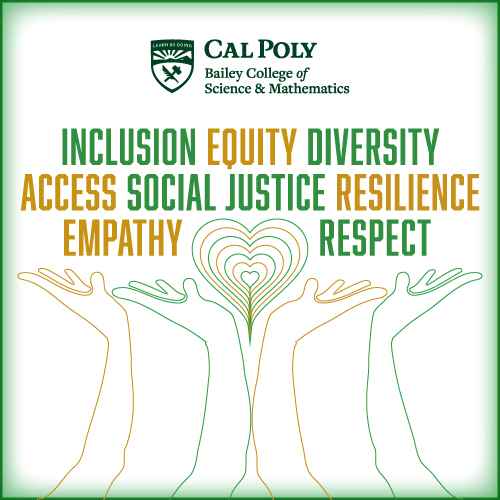Joining Forces: Cal Poly Establishes New Connection with Prestigious African University

By Nick Wilson
Allen Lamtey Kpentey is a dedicated student from Ghana, Africa who is soaking up as many educational and cultural experiences at Cal Poly as he can as part of a new exchange program.
Already, the third-year university student who majors in electrical engineering at Ashesi University in Ghana and physics at Cal Poly, has made new friends, visited Farmer’s Market and played recreational sports since arriving at the start of winter quarter. Kpentey is one of three students from Ashesi taking part in the exchange between Cal Poly and the African university that aims to build multicultural connections for years to come.
Ashesi University students Kpentey, Ropa Nhanga (physics) and Samuel Asiedu-Awuah (engineering) are taking a full slate of classes and absorbing new ways of life, living in Cal Poly housing.
“The Ashesi students are bringing a different mindset over here,” said Nathan Heston, a Cal Poly physics faculty member, who previously served in the Peace Corps in Ghana. “They’re bringing their background, history, academic experiences, and that’s what I think enriches the relationships for our students, who get that amazing exposure to perspective from another part of the world.”
Ashesi students studied at Cal Poly for six months in winter and spring quarters. The new exchange program, involving Bailey College of Science and Mathematics and College of Engineering, will send Cal Poly students to the western African university in the fall.
Kpentey said that his first impression of Cal Poly is one of a vibrant, friendly community with a robust polytechnic education.
In his course work at Cal Poly, he has enjoyed learning about the associations between electronics and physics.
“The concepts of electricity are bounded by physics, like how voltage is generated by changing magnetic fields,” Kpentey. “So, once you get those fundamentals down, you can go forward with whatever you’re studying in engineering.”
During winter, Kpentey even tagged along with Heston to fix a friend’s broken water pump after an electrical short circuit. In his country where power outages are common, Kpentey is interested in how U.S. systems function.
“Allen has worked as a student intern for the electricity company in Ghana and wanted to be involved,” Heston said. “It’s great for students like him to experience life in America and for our students to go to Ghana and to live in a place where things work much differently.” Power outages are common in Ghana and used to occur on a regular schedule four to five hours per day, Kpentey said.
“Everything is so well-oiled and greased in the U.S. that you almost feel like that’s natural,” Heston said. “But in places like Ghana, you’re often trying to troubleshoot systems. Just getting Zoom to work might not be possible.”
Most Ashesi students and many working people don’t have cars, relying on public transportation. And a dirt road leads to the Ashesi school, where students rarely leave the campus area because of its relative distance from the nearby town of Berekuso, Kpentey said.
Nonetheless, Ashesi is known to be a prestigious university and tech hub in Ghana with connections to Google, Stanford Graduate School of Business, MIT and many top Ghana businesses, Heston said.
At Cal Poly, besides his full slate of classes — electronics and instrumentation, modern physics, and system dynamics and survey of economics — Kpentey has joined in recreational games of flag football, volleyball and soccer, observing a robust sports culture.
Ghana has 10 common languages and about 60 total, including dialects, though English is used from junior high on in schools.
Kpentey said that he has learned some new slang words in SLO such as “shotgun,” meaning the front seat of a car.
“I enjoy meeting new people,” Kpentey said. “On the first day we came, a door of a room on our floor (at Poly Canyon Village) was slightly open and you could tell there were number of people in there. I just thought, ‘Okay, let's go for it’ and rang the doorbell and said ‘Hi.’ I just introduced myself and I'm friends with all of them now.” On a recent visit to the SLO Farmer’s Market, Kpentey said that he was “mind-blown” by the number of vendors and food options and samples.
“You can walk around with friends, see some performances, buy some food,” Kpentey said. “I think that’s amazing. Aside from getting something you need, it builds community spirit and I really like that.” Kpentey added that he hopes to go bowling and see a movie in the theater. “Anytime a new movie comes out in Ghana, all the cinemas get so crowded,” Kpentey remarked.
Ashesi has students from other African nations, such as Zimbabwe, Ropa Nhanga’s hometown. “I feel like I have learned to make Ghana a home away from home, and I hope in some way to do the same thing here,” Nhanga said of her Cal Poly experience. “I hope to work on more hands-on projects.”
Nhanga added: “I hope to grow in terms of my approach to work and creativity. I’ve already tried lots of different foods and I aim to keep doing so. I hope to do fun activities that I would not normally do back home — taking a hike, going bowling, watching live sports games.”
Working alongside Bailey College of Science and Mathematics Associate Dean Kellie Green Hall, Heston helped establish the new program.
“We first started looking at how we can make the exchange happen, and the cost was a huge factor,” Hall said. “For example, students in Ghana pay about $200 per month in housing there and meals cost $1 to $2, so we need to make it possible for students to be able to afford studying here.”
Hall said donor funding sources will be needed to continue the program.
An additional advantage to this established exchange program is that Cal Poly faculty can also teach and offer their expertise at Ashesi, through faculty exchange opportunities.
In 2019, Cal Poly students visited Ghana with Heston and physics Professor Pete Schwartz, along with construction management professors Paul Redden and Lonny Simonian, to build a community center and water purification system for a small village in Ghana, which helped kickstart the Ashesi relationship.
Hall emphasized, “We, in the Bailey College of Science and Mathematics, are very excited about this exchange program because Ashesi University offers an exceptional educational experience for our students and on our campus. Having Ashesi students in our classes creates a fascinating learning experience for everyone.”
Photo 1: Photo information: In photo at top, African exchange students Samuel Asiedu-Awuah, Ropa Nhanga and Allen Lamtey Kpentey (from left to right in the front row, starting second from the left), from Ashesi University in Ghana, attend a lunch with the staff from the Bailey College of Science and Mathematics.

Photo 2: African exchange student Allen Lamtey Kpentey on Baker Lawn.

Photo 3: Ashesi University students Ropa Nhanga (front left) and Allen Lamtey Kpentey (from middle) attend a lunch alongside CSM Associate Dean Camille O’Bryant (front right). Samuel Asiedu-Awuah, the third of the Ashesi exchange students at Cal Poly this year, is in the background.




